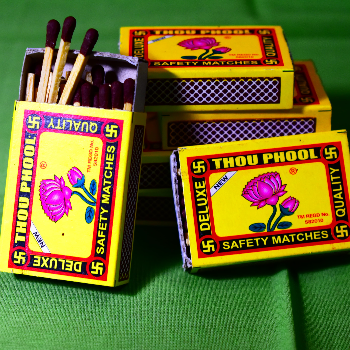In the bustling village of Thiruvallur, where the sun rises with a promise of a new day, lives a woman named Meena. A mother of three and a caregiver to her elderly in-laws, Meena's day begins long before the first light of dawn. Her life, like many others in rural India, revolves around the simple yet vital task of managing her household. At the heart of her daily routine is an unsung hero the humble match box.
For Meena, the match box is more than just a tool to ignite a flame. It is a symbol of convenience and reliability, a small yet powerful ally in her quest to keep her family warm and well-fed. In rural areas like Thiruvallur, where electricity is often unreliable, and modern amenities are sparse, the match box is indispensable. It is the spark that lights the chulha, the traditional clay stove, for cooking meals that nourish her family.
Meena’s story is not unique. Across India, countless families rely on match boxes to light their stoves, lamps, and even diyas during festive occasions. The match box has become an integral part of their lives, solving a distinct problem that is both practical and emotional.
One of the major challenges faced by Meena and her community is the unpredictability of electricity. Power cuts are frequent, leaving families in the dark and disrupting their daily activities. This is where the match box becomes a beacon of hope. With a single strike, it brings light to darkness, enabling Meena to continue her chores, ensure her children’s homework is done, and create a warm, inviting atmosphere for her family.
Moreover, the emotional connection tied to this simple product is profound. Lighting a diya with a match stick during Diwali or igniting the fire for a traditional meal brings a sense of continuity and cultural identity. It connects Meena to her roots and to generations past who performed the same rituals. It is in these moments that the match box transcends its practical utility to become a vessel of tradition and emotion.
A case study from the neighboring village of Kanchipuram highlights the impact of match boxes in enhancing the quality of life. Savitha, a local entrepreneur, started a small business selling homemade snacks. Her reliance on match boxes to prepare these snacks is critical. With the steady supply of match boxes, she can maintain her production schedule, ensuring her snacks reach customers fresh and on time. This reliability has helped her business grow, providing her family with financial stability and the community with employment opportunities.
In a market flooded with modern innovations, the match box stands out as a testament to simplicity and effectiveness. Its affordability and accessibility make it a staple in every household. For Meena, Savitha, and many others, it is a tool that empowers them to overcome daily challenges, both big and small.
As we celebrate the significance of such a humble product, it is essential to recognize its role in transforming lives. The match box is more than just a means to an end; it is a catalyst for empowerment, a keeper of traditions, and a symbol of independence.
In the grand tapestry of life in rural India, the match box is a thread that binds families and communities together, one flame at a time. With every strike, it ignites not just a fire, but hope, resilience, and the enduring spirit of people like Meena and Savitha.
For those living in urban areas, it might be easy to overlook the importance of such a seemingly insignificant item. However, remembering the impact it has on millions of lives across rural India is a reminder of the power of simplicity and the profound effects of small conveniences on daily life.
Visit Vyaparify Site:
https://id.vyaparify.com/sri-kamatchiammal-match-works 
